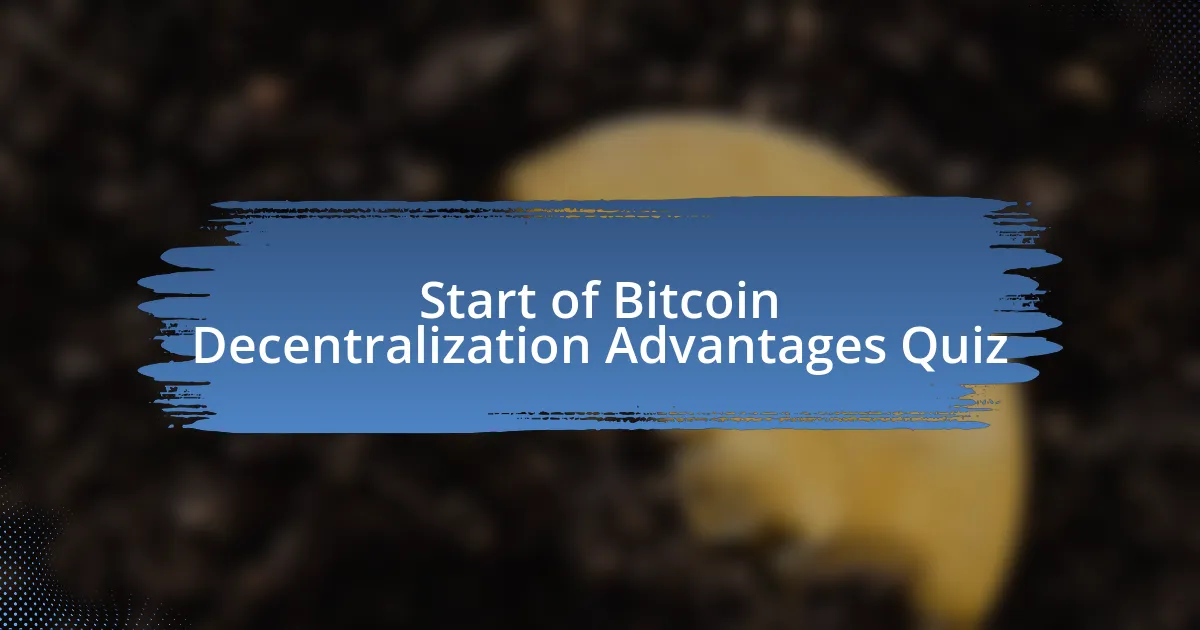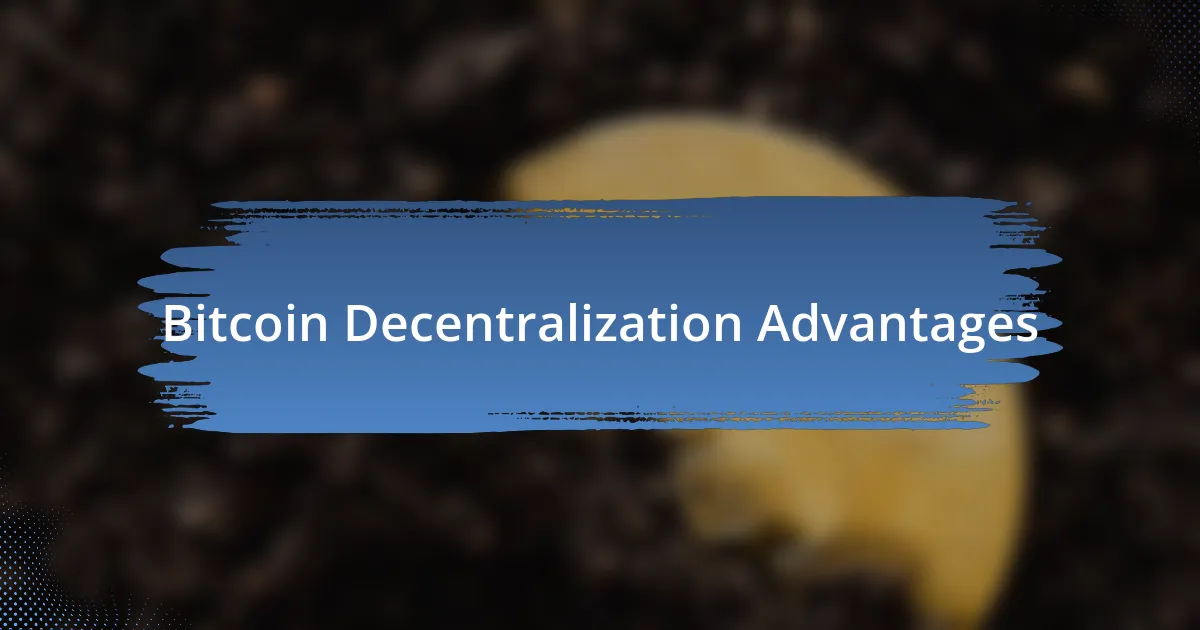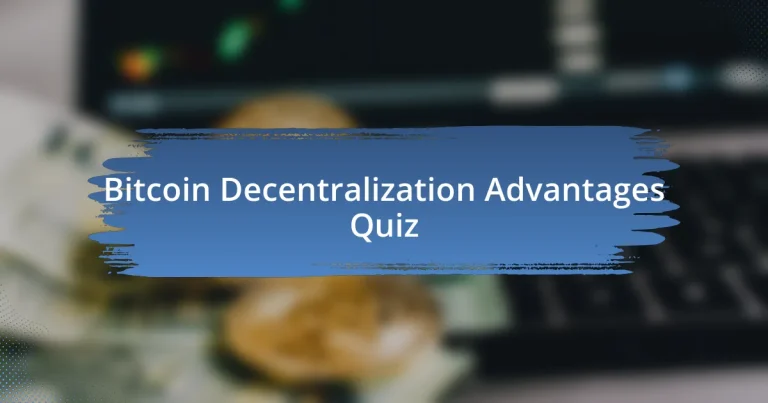
Start of Bitcoin Decentralization Advantages Quiz
1. What is the primary benefit of Bitcoin`s decentralized control structure?
- It lowers the cost of Bitcoin compared to fiat currency.
- The lack of central counterparties and regulatory authorities.
- It guarantees complete anonymity for all users.
- It increases transaction speeds significantly.
2. How does Bitcoin`s decentralized network `democratize` payments?
- By ensuring that only one entity can control transaction validity.
- By limiting access to using specific financial institutions only.
- By enabling direct transactions without any fees involved.
- By allowing nodes to vote with their CPU power, expressing acceptance of valid blocks and rejecting invalid blocks.
3. What is the consensus mechanism used in Bitcoin to enforce rules and incentives?
- Byzantine Fault Tolerance
- Proof of Work
- Proof of Stake
- Delegated Proof of Stake
4. What is the role of miners in the Bitcoin network?
- Miners charge fees for processing transactions manually.
- Miners store all transactions on a central server for faster access.
- Miners verify transactions and add them to the blockchain, earning bitcoin in the process.
- Miners create new currencies and distribute them among users.
5. How is the accuracy of the blockchain ensured in Bitcoin?
- Through a process called `proof of work.`
- By using personal identification techniques.
- Through centralized decision-making authorities.
- By employing a traditional banking system.
6. What is the advantage of Bitcoin`s open-source software?
- It ensures all users remain completely anonymous at all times.
- It can be maintained and improved by a large enough consensus of users, and these decisions are transparent.
- It guarantees the highest level of security with no vulnerabilities.
- It allows for unlimited transaction speed without any delay.
7. What problem does Bitcoin`s decentralized environment introduce regarding decision-making?
- It allows for a single user to decide on all changes.
- It can sometimes force an outcome that is less efficient than the optimal outcome.
- It simplifies the decision-making process for all users.
- It increases the speed of decisions being made.
8. How is accountability enforced in a decentralized environment like Bitcoin?
- Accountability is strictly monitored by central authorities.
- Transactions are audited by government agencies.
- It is harder to enforce accountability compared to a centralized environment.
- Users are required to submit identification for tracking.
9. What is required for a major change to be implemented in the Bitcoin network?
- Changes can be made by any developer at any time.
- Only miners need to approve the changes.
- Every member of the network must vote to adopt the changes.
- The Bitcoin Foundation alone decides on the changes.
10. How does Bitcoin`s decentralized system maintain the authenticity and integrity of messages?
- By using a central authority to verify transactions.
- Through an extremely secure encryption process.
- By allowing anyone to alter the transaction data freely.
- Through random selection of transaction records.
11. What is the name of the technology underlying Bitcoin?
- Blockchain
- Smart Contracts
- Distributed Computing
- Cryptography
12. Is Bitcoin truly anonymous?
- No, only the sender`s information is visible, making it fully anonymous.
- Yes, every transaction is completely untraceable and private.
- No, all transactions are recorded on a global transparent ledger that can be traced using analytical technologies.
- Yes, users can choose to hide their address completely from the network.
13. What does an ASIC do for Bitcoin?
- It manages network communications among miners.
- It performs one specific task of solving a mathematical problem in order to find a new block.
- It stores and retrieves user data efficiently.
- It generates random numbers for enhanced security protocols.
14. What is SHA 256?
- A secure hashing algorithm used by Bitcoin, originally designed by the NSA.
- A programming language for creating smart contracts.
- A financial protocol that enables peer-to-peer lending.
- A type of digital currency used for online purchases.
15. What is a nonce in the context of Bitcoin?
- A fixed fee paid to miners for each transaction.
- A security measure to prevent double spending.
- A number used only once to find a new block in the blockchain.
- A protocol for communicating between different cryptocurrencies.
16. How often can we expect a new block to be found by miners in Bitcoin?
- Twice a day.
- Every 5 minutes.
- Every hour on the hour.
- On average, every 10 minutes.
17. What is Bitcoin Pizza Day?
- It signifies the day Bitcoin reached its all-time high price.
- It commemorates the first real-world transaction using Bitcoin, where 10,000 BTC were used to buy pizza.
- It celebrates the launch of Bitcoin trading platforms worldwide.
- It marks the anniversary of Bitcoin`s creation as a currency.
18. What does the decentralized nature of Bitcoin exchanges prevent?
- Centralized control of funds
- Price manipulation
- High transaction fees
- Lack of user anonymity
19. How do decentralized exchanges (DEX) operate?
- They rely on a regulatory authority to manage trades and users.
- They function through a single market maker who sets prices.
- They operate using a centralized server to facilitate trades.
- They operate based on a Peer-to-Peer algorithm, directly between buyer and seller.
20. What is the benefit of using decentralized finance (DeFi) platforms?
- They give users 100% control over their finances.
- They increase transaction fees significantly.
- They are only available during business hours.
- They eliminate the need for technology.
21. How do DeFi platforms minimize transaction intermediaries?
- Through the peer-to-peer algorithm.
- By implementing centralized control over transactions.
- By using traditional banks for transactions.
- Through high transaction fees from intermediaries.
22. What is the cost of buy-sell transactions on DeFi platforms?
- Average buy-sell transaction costs.
- High buy-sell transaction costs.
- No buy-sell transaction costs.
- Low buy-sell transaction costs.
23. How resilient are DeFi platforms to failures?
- They are vulnerable due to centralized control.
- They frequently experience system-wide shutdowns.
- They rely solely on third-party applications.
- They are resilient to failures because they are built on existing blockchains.
24. Can users track transactions on DeFi platforms?
- Yes, users can track transactions and changes through open-source technology.
- No, transaction data is kept secret to protect user identity.
- Yes, but only the platform administrators can access transaction details.
- No, transactions are entirely private and untraceable.
25. Is DeFi available 24/7?
- Yes, but only during weekends.
- No, it operates only during business hours.
- No, it is available for limited hours.
- Yes, it is available 24/7 with access to the Internet.
26. Is there censorship in DeFi platforms?
- Censorship is enforced by the community.
- Censorship is selective and variable.
- No, there is no censorship.
- Yes, there is strict censorship.
27. Does DeFi ensure anonymity?
- Yes, it provides anonymity.
- No, it requires a name.
- Yes, it exposes users` identities.
- No, it tracks all personal information.
28. How do DeFi platforms verify smart contracts?
- They conduct audits with external firms.
- They use third-party verification services.
- They allow users to see the code.
- They only rely on user feedback for security.
29. Are DeFi platforms resistant to fraud and hacking attacks?
- No, they are highly vulnerable to attacks and fraud.
- Yes, they are resistant to fraud and hacking attacks.
- Yes, but only during peak transaction times.
- No, they rely on centralized security measures.
30. What is the significance of decentralization in blockchain technology?
- It restricts access to financial services only to banks.
- It centralizes authority, making it easier to manage transactions.
- It redistributes control from central authorities to individuals, ensuring no single entity controls the network.
- It enables governmental control over all transactions.

Quiz Completed Successfully!
Congratulations on completing the quiz about the advantages of Bitcoin decentralization! You’ve engaged with essential concepts that highlight the benefits of a decentralized financial system. This learning experience undoubtedly deepened your understanding of how decentralization fosters security, transparency, and user autonomy within the Bitcoin ecosystem.
Throughout the quiz, you may have discovered how the elimination of intermediaries can reduce costs and increase transaction speed. You likely learned about the importance of network resilience and how it contributes to a more stable and reliable financial environment. Each question helped in breaking down complex ideas into manageable bits of information.
If you found this topic intriguing, we invite you to explore the next section on this page. It offers even more detailed insights into Bitcoin decentralization advantages. Expanding your knowledge will empower you to make informed decisions in the world of cryptocurrency. Dive in and keep learning!

Bitcoin Decentralization Advantages
Understanding Bitcoin Decentralization
Bitcoin decentralization refers to the distribution of control over the network across multiple participants rather than a single entity. This means no central authority can influence or dictate the actions of the network. Each participant, or node, maintains a copy of the blockchain, ensuring transparency and reducing the risk of manipulation. Decentralization is a core aspect of Bitcoin’s design, contributing to its overall security and resilience.
Enhanced Security in a Decentralized Network
Decentralization enhances Bitcoin’s security by removing single points of failure. In a centralized system, if the authority is compromised, the entire network is at risk. However, in Bitcoin, control is distributed across a vast number of nodes. This makes it extremely difficult for any adversary to alter transaction records or take control of the network. The collective agreement required to validate transactions fosters a more secure environment.
Greater Censorship Resistance
Decentralized networks like Bitcoin provide greater resistance to censorship. No central institution can block or reverse transactions. This is particularly beneficial for individuals in oppressive regimes where financial transactions may be monitored or restricted. Users can transact freely and privately, preserving their autonomy and enabling financial freedom without interference.
Increased Accessibility for Users
Decentralization increases accessibility to Bitcoin for users globally. Anyone with internet access can participate in the network without needing permission from a central authority. This opens financial services to underbanked populations, empowering them with tools previously unavailable. The elimination of intermediaries reduces costs and barriers to entry for users who wish to transact or invest in Bitcoin.
Reduced Risk of Systemic Failure
Decentralization reduces the risk of systemic failure within the Bitcoin network. In centralized systems, failures can lead to collapse, affecting all users. Conversely, Bitcoin’s decentralized structure means that the failure of one node does not compromise the network’s integrity. Each node operates independently, allowing the network to maintain functionality and reliability even in adverse conditions.
What are the advantages of Bitcoin decentralization?
The advantages of Bitcoin decentralization include increased security, resistance to censorship, and enhanced privacy. Decentralization means no central authority can control or manipulate the network, making it less vulnerable to attacks. For example, since Bitcoin operates on a distributed ledger, it is difficult for a single entity to alter transaction records without consensus from the majority of nodes.
How does decentralization improve Bitcoin’s security?
Decentralization improves Bitcoin’s security by distributing control among multiple nodes. This distribution makes it significantly harder for attackers to compromise the network. With over 10,000 nodes globally, any attempt to alter the blockchain would require an attacker to gain control of more than 51% of those nodes, an extremely difficult task given the network’s size and growth.
Where does Bitcoin’s decentralization occur?
Bitcoin’s decentralization occurs across its global network of nodes and miners. Each node maintains a copy of the entire blockchain and participates in validating transactions. This network structure ensures that no single person or entity holds complete authority, thereby preventing centralized control from any government or corporate body.
When did Bitcoin achieve decentralization?
Bitcoin achieved decentralization shortly after its creation in 2009. Initially, it was supported by a small number of users, but as its popularity grew, many independent miners and developers joined the network. The continuous increase in users and miners over the years has solidified its decentralized nature, making it one of the first successfully decentralized digital currencies.
Who benefits from Bitcoin decentralization?
Individuals, businesses, and developers benefit from Bitcoin decentralization. Users have greater control over their funds without relying on banks. Businesses can conduct transactions without fear of interference. Developers enjoy a level playing field, as they can create applications without needing permission from a central authority, fostering innovation and competition.


